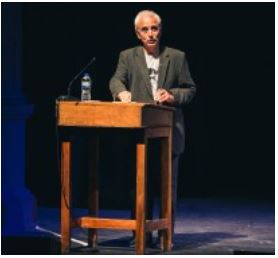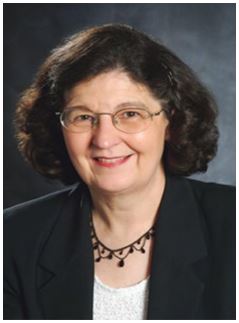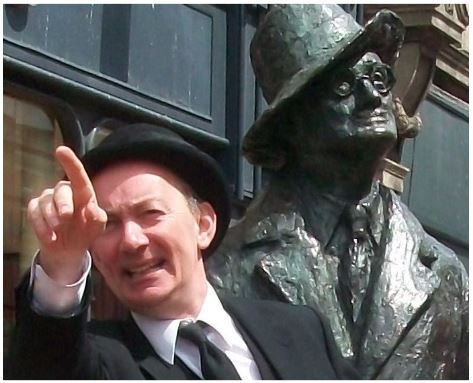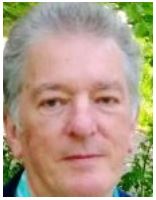The Professors in Prison Project is part of the bigger applied arts project Forgotten Futures and Radical Landscapes (April 2022 - Oct 2022). This project was kindly supported by Liverpool Hope University and enabled us to bring 8 visiting professors/artists/lecturers into HMPLiverpool prison to deliver sessions to the prisoners. Each session was a masterclass exploring the professor's area of research/practice. We selected a variety of professors/practitioners to participate from around the country. The project was prisoner-led encouraging the men to question and discuss each area of research. It proved to be highly successful with the prisoners fully engaging in the classes and the visiting professors really benefiting from their encounter.
Participating professors:- Professor Tim Prentki, formerly Winchester University
- Professional Actor Paul O'Hanrahan
- Professor Malcolm Miles, formerly University of Plymouth
- Professor Susan Felch, Calvin University, USA
- Professor Helen Newall, Edge Hill University
- Professor Michael Hauskeller, University of Liverpool
- Dr Matt Smith, University of Portsmouth
- Dr Paddy Hoey, Edge Hill University
- Dr Paddy Hoey, Edge Hill University
Statements from our Visiting Professors

Friday, April 29 th saw the launch of the new project Professors in Prison created by Dr Niamh Malone and Dr Gary Anderson. As part of the Forgotten Futures and Radical Landscape Applied Theatre Project, this strand of practice sees eight professors from a range of disciplines and backgrounds, visit HMPLiverpool (Walton gaol). The professors deliver a bespoke seminar to a group of prisoners who are participating in a weekly educational programme with Drs Malone and Anderson. Last Friday saw Professor Tim Prentki (Winchester University) an international scholar in Theatre for Development, facilitate an inspirational workshop for the prisoners. Professor Prentki said 'My visit to HMP Liverpool on April 29 th 2022 as part of the "Professors in Prison" project was a rich and rewarding experience for which I would like to record my thanks to staff and inmates. The encounter revealed the value of dialogue for both prisoners and visitors. The latter were impressed with the quality of the informal knowledge displayed by the group, while the former, I hope, benefitted from hearing about the structural benefits of formal education in resisting the chaos of life on 'the outside'.
It is clear that many prisoners could be converted from a burden on the state to an invaluable social resource if offered the opportunity. The parallel with the plight of refugees and asylum-seekers is irresistible.'
According to an adult leaner in the prison ‘That blew my mind that did. Who would have thought you can use theatre like that. I love all that work he did in India and Brazil, it makes you think about communities and what they need’.
The project continues for the next three months.
**********************************************************

Our visiting professor, Dr Susan Felch, from Calvin University, Michigan, generously accompanied Drs Malone and Anderson to HMPLiverpool on Friday 13 th May to deliver a stimulating and insightful seminar to the prisoners. As a Professor of English Literature, Susan’s workshop with the men really captured their imagination and generated an enthusiastic discussion around perceptions and ekphrastic writing. Professor Felch’s response to her experience captures how rich an experience it proved to be, not only for her, and our own undergraduate students Louis Peart and Lara Jones (final year BA Drama students) but especially for the prisoners “Thank you for the opportunity to participate in Liverpool Hope University's Professors in Prison project. Sharing Bruegel's "Landscape with the Fall of Icarus" and two ekphrastic poems by William Carlos Williams and W.H. Auden with the prison students was the highlight of my week. I was struck by the concentration and focus these men, who live such restricted lives, brought to unpacking three complicated works, proof both of their resilience and the power of art to release and engage the human spirit. I was also impressed with the structure of the program, which gathered professors, Hope students, prison educators, and prison students around a table as learners in a common enterprise”.
The project continues, inviting a new professor every week to work with the prison leaners.
**********************************************************

Our latest visiting professor to HMPLiverpool, as part of the ongoing Professors in Prisons Project, was Professor Helen Newall from Edge Hill University. She delivered an interactive and captivating workshop for the prisoners focusing on the role of memory and narrative formation.
Prof Newall “I had an extremely inspiring morning: it was really wonderful to see how interested and engaged the participants were: they are not slow to tell us what they think, and show their enthusiasm, and I really enjoyed interacting with them. They listened attentively, they asked questions and offered ideas, and they seemed moved by my description of the content of the creative film I have made dealing with commemoration and World War 1; we examined stills from the film and looked at the photographic portraits of WW1 soldiers from which the film was made. They showed great empathy for the young men depicted in the work, and we had a meaningful exchange of ideas about history and memory and what it is to be forgotten and remembered via photography. This was an inspiring moment for me as much as for them, being as they are also a kind of forgotten generation. I applaud the magnificent work that Niamh and Gary are doing via the project and I'd do it again in a heartbeat.”
One of the participating prisoners said at the end of the workshop “I love all this kind of stuff. I was going to join the army. It’s sad seeing all those soldiers with no record, but they’re our men, and we have an obligation to remember them. It’s only right that we do. Yeah, I’d love to study more of this.”
**********************************************************

Friday 6 th May saw the esteemed actor, Paul O’Hanrahan, deliver an interactive workshop for the prisoners at HMP Liverpool (locally known as Walton Gaol). A new initiative in Walton Gaol is to run small scale art projects that mirror the focus and timing of arts projects that are happening in the City of Liverpool. To coincide with the Samuel Beckett in Confinement Festival 6-8 th May, the prison ran a series of workshops that explored the works of the Irish born literary giant Samuel Beckett. Drs Malone and Anderson, who run the project, were asked by the prison to bring the works of Beckett to life in the prison setting. The professional actor Paul O’Hanrahan was delighted to be able to work with the men, many of whom had never heard of Samuel Beckett. He delivered short performances, followed by intensive discussions about the lasting impact of Beckett’s rich portfolio of work. O’Hanrahan stated “I found it very rewarding to perform some Beckett pieces and to discuss how we relate to his writing and theatre with the two groups in Walton Goal. The participants listened attentively and helped create an environment in which Beckett’s words could resonate. All of their comments were well observed and some, for example, on Beckett’s heightened use of language, very perceptive. There was also some lively discussion about matters such as eating living creatures and a robust reaction when, in talking about the actor’s life, I mentioned a politician [Mrs Thatcher]: such is the power of words! I am grateful to Dr Malone and Dr Anderson for their skill and expertise in setting up this particular dramatic dialogue”.
**********************************************************
Professor Malcolm Miles was our latest visiting professor to HMPLiverpool, Friday 20 th May. Professor Miles is one of the most important cultural theorists in UK with a prolific career in academic publishing, having penned 11 books to date. It was great to get a professor of Malcolm Miles’ calibre to part take in this project, which is part of the HMP to HOPE applied arts project ran by Drs Malone and Anderson (Creative and Performing Arts).

This is Professor Miles’ response to his experience as a visiting professor in HMPLiverpool.
“This was the first time I had been inside a prison. I had various pre-perceptions from films, television, newspapers and so forth. I was nervous, daunted by what the atmosphere might be like. I was particularly glad to be part of a group of five, with two trusted friends from the staff of Liverpool Hope and two students.
On arrival, the security procedures distracted attention from the place, then we were met by someone from the Education Department who took us briskly through mainly open spaces to the wing and the room – which looked like any community arts/education venue. Once everyone was settled down it felt like any discussion outside higher education: people contribute the kind of knowledge they have, either intellectual/professional, or tacit. I remembered various discussions years ago in urban design settings about the status of tacit knowledge – dwellers are experts on where they dwell, but the knowledge is intuitive, experiential, embodied – and thought again that these kinds of knowledge should be given equal status in any broad discussion. So I learnt that. I tried to speak clearly, just as myself and as the moment seemed to say. I hope the prisoners got something from it; they seemed pleased to be there. The students made a really good, relaxed but informative, contribution. Gary and Niamh ran the session very well, intervening as necessary but keeping it as open as possible. That open-endedness seemed important.
On leaving the room, we were taken on a circuitous tour of the prison, including the Victorian wing with multiple levels, railings, rows of metal doors. We were courteously given an explanation (including mention of multiple fights). These de-humanising buildings were designed to punish in their own way (alongside the workhouse and the school), breeding desperation and desolation in equal measure. I was desperate to get out”.
**********************************************************